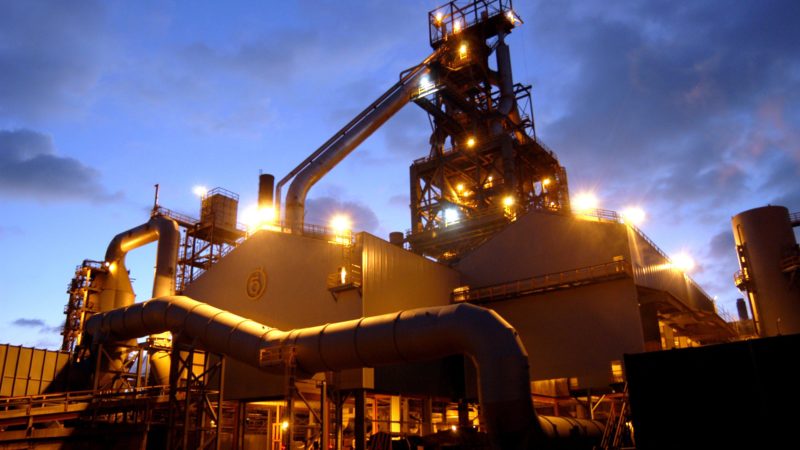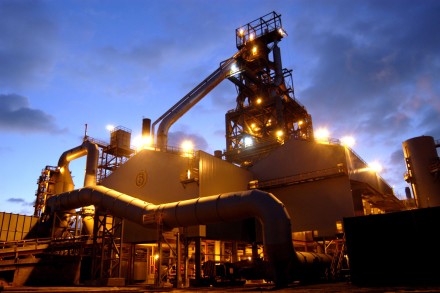

In the week 4,000 Tata UK jobs hung in the balance, Stephen Kinnock flew to Mumbai to engage in some last-minute lobbying on behalf of steelworkers. Later, Jeremy Corbyn travelled to Port Talbot to meet the community affected. In contrast, David Cameron went on holiday to Lanzarote. And Sajid Javid jetted off to Australia.
Rarely can an update on MPs’ travel plans have been so depressing – or so shameful.
When Labour MPs were negotiating, suggesting ideas, campaigning for the steel industry or protesting against Tata, the Tories were not even here.
George Osborne has been remarkably quiet and there is a grim irony in the fact his last Twitter post – about buying ice-cream in his constituency – was to champion local manufacturing.
As important as the ice-cream industry is, it doesn’t quite compare to the economic and cultural impact of the Great British steel industry.
Steel has been part of life in Port Talbot for more than a century. In fact, construction on the original steel mill began in 1901, a year in which Queen Victoria was still on the throne.
But the importance of this industrial heritage has been lost on a ruling Tory clique which is relaxed – or even excited – about the onward march of the free market, whatever the consequences for British workers and their way of life.
It is shocking, but not surprising. The reality was little different in Redcar, where 2,200 jobs were lost when parent company SSI closed the steelworks in October after 98 years of production.
Now the axe hangs over thousands of jobs in Port Talbot after Tata decided the turnaround plan was “unaffordable”.
The Government knew the decision was coming. They didn’t send a minister to the Tata board meeting in Mumbai yesterday – although Kinnock, whose Aberavon constituency includes Port Talbot, still had the wherewithal to get over to India.
Instead Javid, the Business Secretary, flew to Australia where he was due to address a business lunch. Then, in an absurd development that would be funny if it were not so pathetic, he bowed to political pressure, abandoned his trip soon after arriving and starting the long flight back to Britain.
When a Downing Street spokeswomen was asked why the Government had not sent anyone to the Tata meeting in Mumbai, she said there was “no invitation” – so rather than not caring, were ministers just to shy to ask if they could come along?
Kinnock accused the Government of “abject failure” over Tata Steel. He is right. Of course, some critics argue that Britain should not prop up a declining industry, that Port Talbot’s mill’s estimated losses of £300m a year are too great for the owner to bear and that the sector has been devastated by declining commodity prices.
None of these, however, present a case for the Government indifference and inertia we have seen this week, this month or over the last six years.
Javid, an arch-Thatcherite, has seemed incapable of even uttering the words “industrial strategy” and has refused to unequivocally commit to matching even the imperfect commitments to business support of Sir Vince Cable, his Liberal Democrat predecessor.
So Kinnock’s charge-sheet against Javid is considerable: failing to do something constructive about Chinese steel dumping, acting as a “ringleader” against European Commission measures to tackle the problem, and presiding over an industrial approach so weak and politically-motivated that is equates to “rolling out the red carpet for Beijing”.
It is only now that ministers are considering “temporary” support – but Javid has already ruled out nationalisation.
If you want an explanation then you don’t have to look far. It’s the typical mixture of ideology, incompetence and arrogance which has come to define the Tories’ attitude to industry.
They don’t like state intervention because it goes against their creed. When they grudgingly decide to take Government action in key sectors or regions, such as through the setting-up of eighties-tribute enterprise zones in the last parliament, it has rarely had a significant impact. And when confronted with an industrial crisis outside their political landscape, they rarely look interested.
The reality of the Tories’ approach to the steel industry can be found among a few truths blurted out by an emotional Iain Duncan Smith in the aftermath of his resignation: “it doesn’t matter because they don’t vote for us”. A wave of job losses or spending cuts in an area of weak Tory support – like Port Talbort or Redcar – doesn’t matter to Osborne or Cameron. And, in case you think that sounds too cynical to be believed, the Tories polled 11.9 per cent of the vote in Kinnock’s seat in the General Election.
We have all seen Osborne parading his hard hat in the aftermath of budgets but today neither the Chancellor nor his yellow prop could be found. Instead, Anna Soubry, Javid’s deputy, was sent out to explain the Government’s position, before she was later contradicted by her boss,.
This incompetence and indifference shames the steel industry and shames Britain. But if you are wondering why senior ministers don’t seem to notice the depth of a crisis until it is too late then the only conclusion I can find is that if you don’t notice, it’s because you simply don’t care.



More from LabourList
Exclusive: Poll shows Starmer more trusted than PM on Middle East crisis
Revealed: Poll shows 1 in 4 Tory voters says Rayner faces ‘smear campaign’
‘Ignore the noise – the soft left is alive and well in Open Labour and beyond’